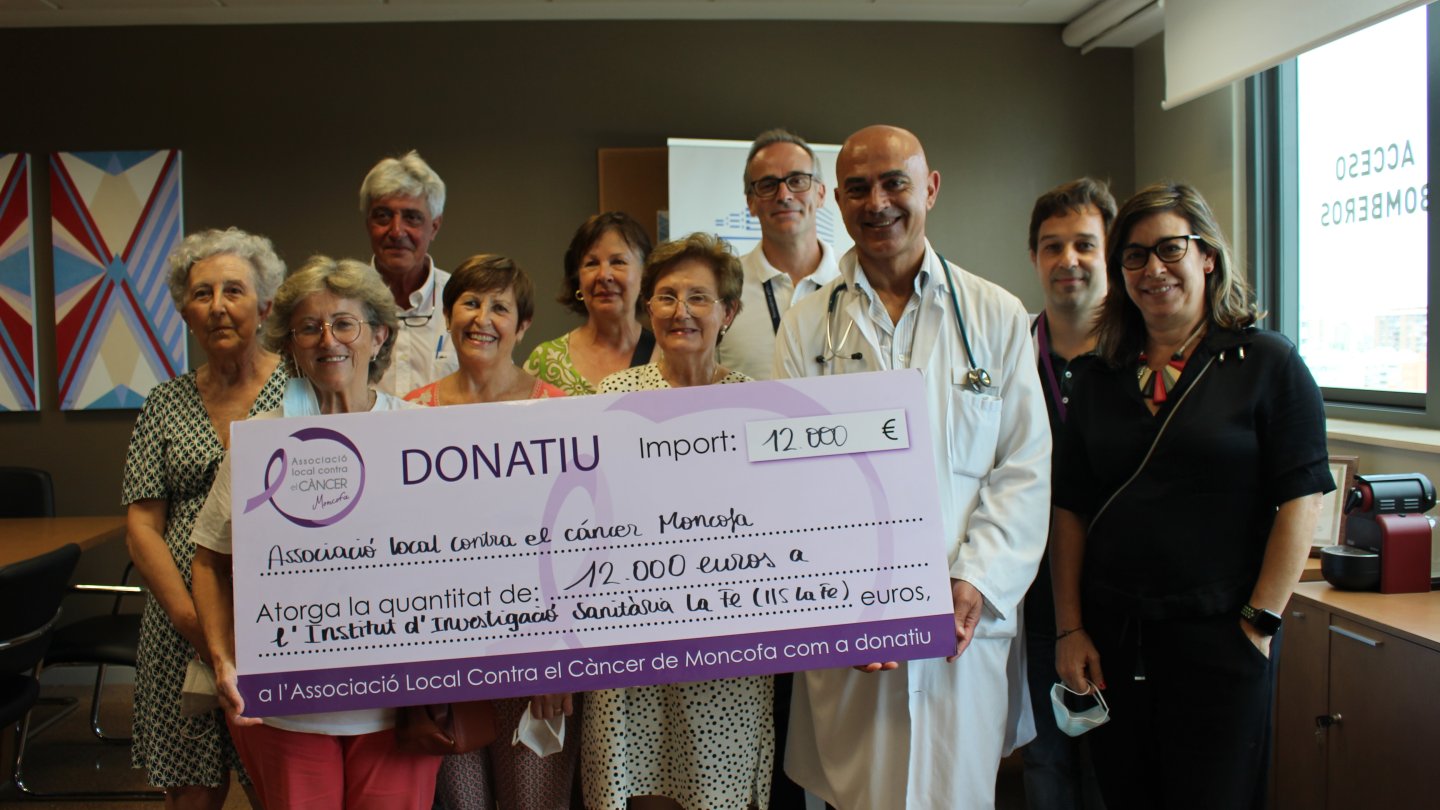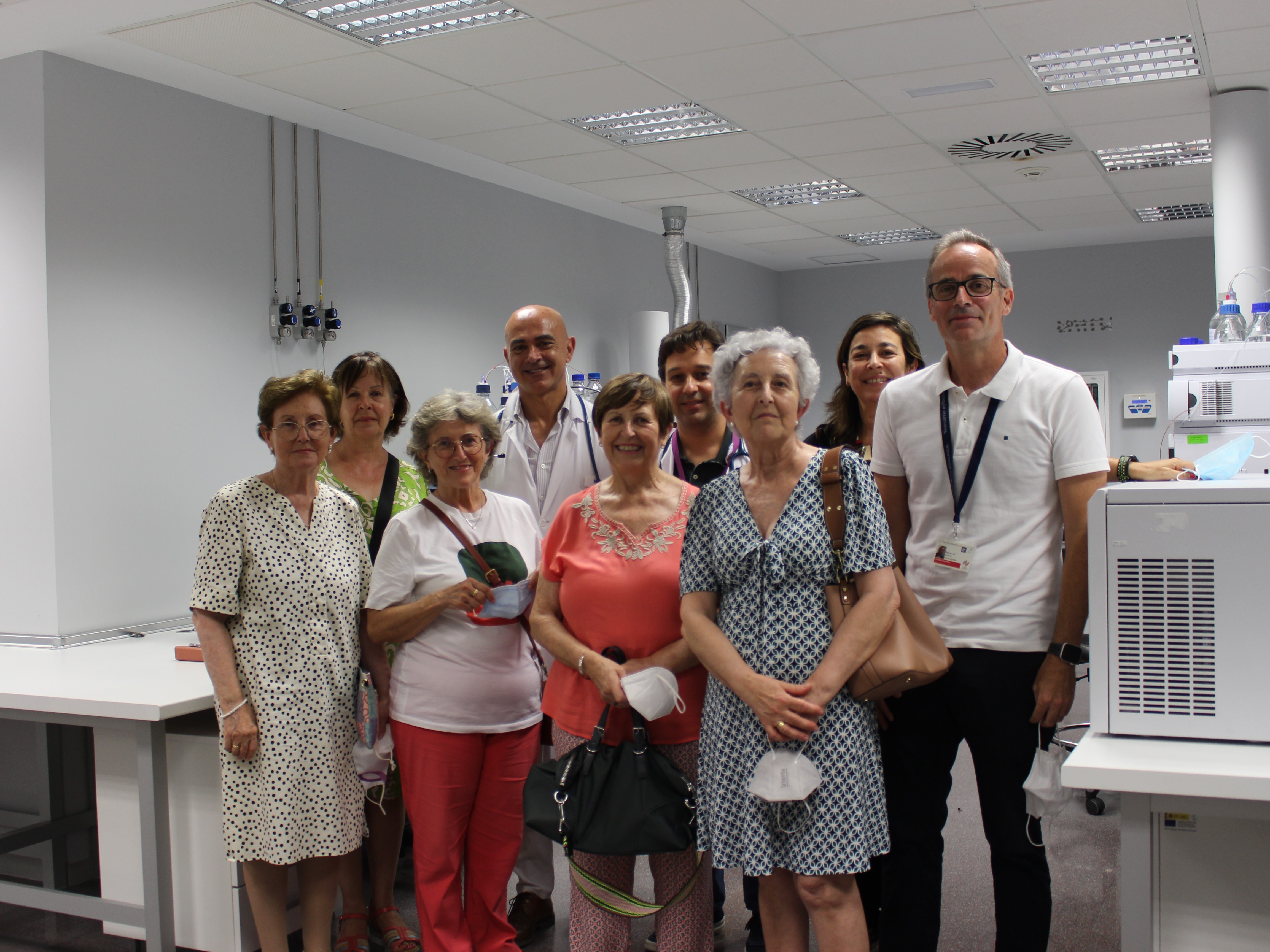News
The Local Association Against Cancer of Moncofa supports lung cancer research developed by the IIS La Fe with a donation of 12,000 euros.
Representatives of the association presented a symbolic check for 12,000 euros that will be used for a project on precision medicine in lung cancer.
The aim of the study is to increase the efficacy of immunotherapy and to search for biomarkers that anticipate the possible benefit for patients.

The Local Anti-Cancer Association of Moncofa has visited the La Fe Health Research Institute (IIS La Fe) to deliver the donation of 12,000 euros that will contribute to boost lung cancer research developed by the Biomarkers and Precision Medicine Unit (UBMP) in collaboration with the Oncology Service of the Hospital Universtiari i Politècnic La Fe.
Dr. Agustín Lahoz, head of the Biomarkers and Precision Medicine Unit (UBYMP) of IIS La Fe; Dr. Oscar Juan, head of thoracic tumors of the Medical Oncology Service of Hospital La Fe and Dr. José Gómez Codina, head of the Medical Oncology Service of Hospital La Fe, were in charge of receiving the donation together with the scientific director of IIS La Fe, Dr. Guillermo Sanz. After the delivery of the check, the representatives of the Local Association against Cancer of Moncofa, have visited the laboratory of the UBYMP and the Analytical Unit, places where research in lung cancer of IIS La Fe is developed and where they have been able to talk to researchers and researchers.
Objective: to increase the efficacy of immunotherapy
The project to which the financial aid will be allocated is entitled 'Inhibition of nicotinamide N-methyl transferase to improve the blockade of immune checkpoints in lung cancer: Role of myeloid suppressor cells'. This work seeks to increase knowledge about a type of immunotherapy called immune checkpoint inhibitors (ICIs) that has been a breakthrough in the treatment of non-small cell lung cancer. Despite these advances, only 20% of patients show a lasting response at 5 years with treatment with ICIs or in combination with chemotherapy.
The aim of the research team at IIS La Fe is to increase this percentage with a project that proposes, on the one hand, to increase the efficacy of immunotherapy through the use of other drugs that enhance its effectiveness and, on the other hand, to search for biomarkers that anticipate whether or not the use of immunotherapy will have a therapeutic benefit in patients.
In recent years, immunotherapy has emerged as one of the most promising therapies in the fight against cancer. Immunotherapy consists of the use of substances produced by the body or in a laboratory that help the immune system recognize and destroy cancer cells.
The impact on the National Health System of this project would be important as it would improve the treatment of one of the most deadly cancers and one that generates the highest healthcare costs. The use of treatments that increase the efficacy of immunotherapy constitutes a feasible therapeutic avenue that could increase the benefit of the use of immune checkpoint inhibitors.

Research team
The Biomarkers and Precision Medicine Unit (UBMP) at IIS La Fe is a research group interested in the study of metabolism, epigenetics and their interrelationship in cancer biology. The UBMP brings together clinical and basic researchers who share a strong motivation to carry out translational research that serves as a bridge between the laboratory and the clinic.
Since its foundation, the Medical Oncology Service of Hospital La Fe has been accredited as a reference unit for the treatment of adult solid tumors in the Valencian Community. From the point of view of thoracic tumors, the medical oncology service has extensive experience in the development of research in this type of tumors through participation in more than 100 phase I, II, III and IV clinical trials, with more than 30 in the recruitment phase. There are 5 specialists with experience in thoracic tumors, 4 of them with exclusive dedication to these neoplasms, and 2 of them with exclusive dedication to research activities.
Data on lung cancer in Spain
In Spain, approximately one person dies of lung cancer every twenty minutes. In 2022, more than 20,000 people died of this disease, a figure that is expected to increase in the coming years. The reasons for this high mortality are varied, among them: delay in diagnosis due to the absence of symptoms, high invasiveness, the appearance of resistance to treatment and the absence of molecular biomarkers to guide optimal treatment in 80% of cases of non-small cell lung cancer.







